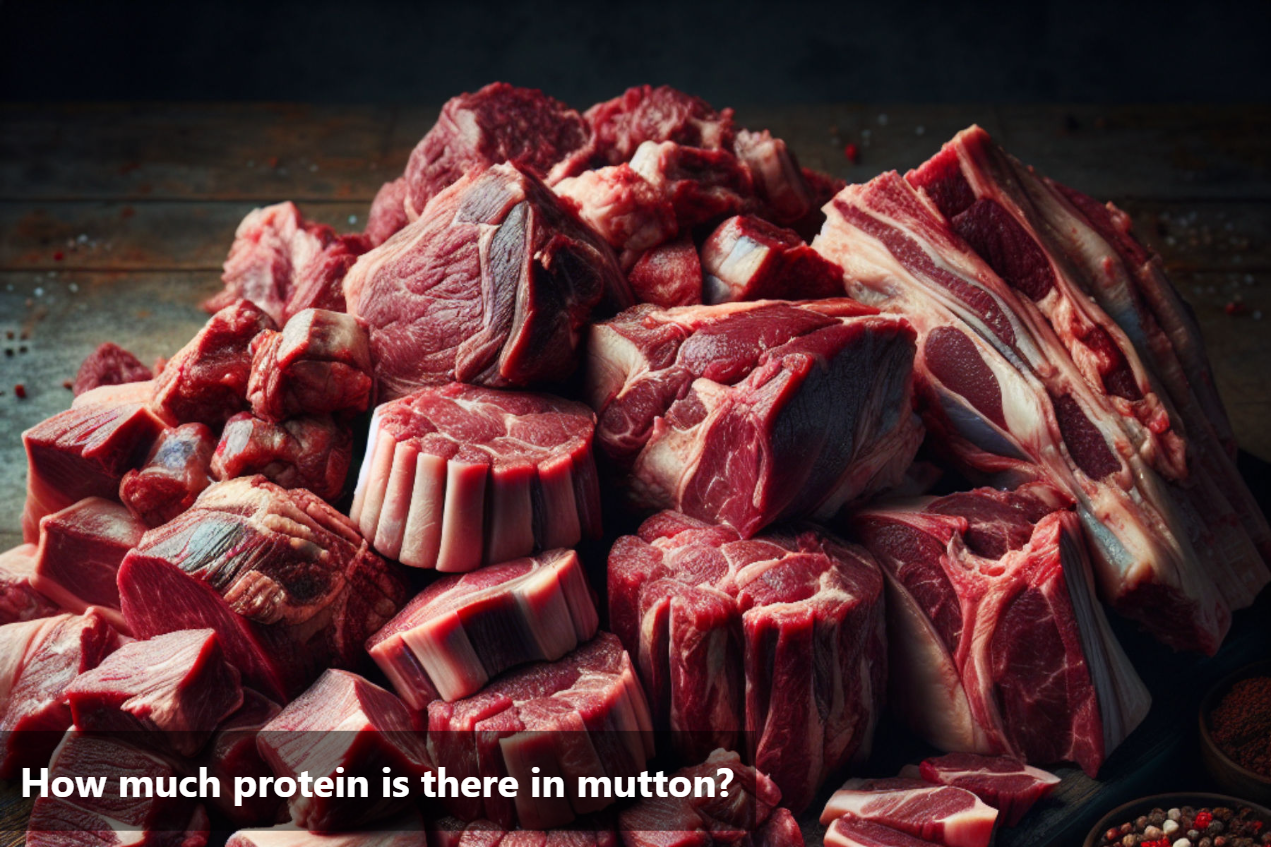
How much protein is there in mutton?
Mutton, derived from sheep, is a flavorful and nutrient-rich meat that serves as a significant source of protein in many diets. Protein is an essential macronutrient vital for muscle repair, growth, and overall health. When it comes to mutton, this meat offers a substantial amount of protein, making it a valuable addition to a balanced diet.
In addition to protein, mutton contains various essential nutrients such as iron, zinc, and vitamin B12, which are crucial for maintaining optimal health. The protein found in mutton is of high quality, meaning it provides all the essential amino acids needed by the body.
Including mutton in your diet can be a tasty way to increase your protein intake and enjoy the nutritional benefits it offers. Whether grilled, roasted, or stewed, mutton provides a versatile option for incorporating protein-rich meals into your routine.

Nutritional Profile of Mutton
A 3.5-ounce (100-gram) serving of roasted mutton provides the following nutrients:
Calories: |
234 |
Total Fat: |
11g |
Sodium: |
135mg |
Protein: |
33g |
Cholesterol: |
109mg |
Total Carbohydrate: |
0.1g |
Saturated Fat: |
5.1g |
Calcium: |
10.00mg |
Iron: |
4.76mg |
Potassium: |
409mg |
How much Protein is in Mutton?
Mutton, being a rich source of protein, plays a crucial role in a balanced diet. When it comes to the protein content in mutton, it stands out as a top contender among various meat options.
On average, mutton contains around 25-30 grams of protein per 100 grams of meat, making it an excellent choice for protein intake.
Comparatively, mutton offers a higher protein content than many other meats, including chicken and pork. This makes it an ideal choice for individuals looking to boost their protein consumption.
The high-quality protein found in mutton is essential for building and repairing tissues in the body, making it a valuable component of a healthy diet.
Incorporating mutton into your meals can provide a substantial amount of protein along with essential nutrients like iron and B vitamins. This nutrient-dense nature of mutton makes it a versatile and valuable protein source for individuals following various dietary preferences.
Considering the significant protein content in mutton, it can be a key player in meeting your daily protein requirements. Whether grilled, roasted, or stewed, mutton offers a delicious and protein-packed addition to your meals, supporting your overall health and well-being.
Factors affecting protein content in mutton
Animal Breed- Different breeds of sheep may have varying protein content in their mutton.
Feed Quality- The protein content in the mutton can be influenced by the quality and type of feed provided to the animals.
Age of the Animal- The age of the animal at the time of slaughter can impact the protein content in mutton.
Processing Methods- The way mutton is processed and handled can affect its protein content.
Cooking Methods- The protein content can also be influenced by how the mutton is cooked.
Exercise Levels- The amount of exercise the sheep gets can impact the protein content in the mutton.
Hormones- Hormones administered to the animals can affect the protein composition of the mutton.
Storage Conditions- How mutton is stored can impact its protein content.
Tips for Incorporating Mutton into a High-Protein Diet
Flavorful Kebabs: Marinate small mutton chunks with yogurt and spices, then grill or bake for a protein-packed snack or meal.
Hearty Stews and Curries: Add mutton to slow-cooked stews or curries for tender and juicy protein-rich dishes.
Meatballs or Burgers: Use ground mutton to make flavorful meatballs or burgers for a different high-protein twist.
Mutton Stir-Fry: Make a quick stir-fry with mutton and fresh vegetables for a balanced and nutritious meal.
Creative Pairings: Serve mutton dishes with whole grains or salads to complement your high-protein diet.
Additional Ideas:
Mutton Biryani: Prepare a delicious biryani dish with mutton pieces and aromatic spices.
Mutton Soup: Create a hearty mutton soup loaded with vegetables for a nutritious meal option.
Mutton Tacos: Use mutton meat as a filling in tacos for a fusion of flavors and protein.
Mutton Sandwiches: Make sandwiches with shredded mutton and fresh vegetables for a protein-rich lunch option.

Protein Content in Mutton: A Detailed Look
The protein content in mutton plays a crucial role in maintaining a balanced diet. Mutton is a rich source of high-quality protein, providing essential amino acids necessary for various bodily functions. Incorporating mutton into your meals can be a flavorful way to boost your protein intake and support muscle growth and repair.
When considering how much protein is in mutton, it typically contains around 25-30 grams of protein per 100-gram serving, making it a substantial protein source compared to other meats. This protein content makes mutton an excellent choice for individuals looking to meet their daily protein requirements.
In essence, the protein found in mutton is a valuable nutrient that should not be overlooked in a balanced diet. By incorporating mutton into your meals, you can enjoy its nutritional benefits while satisfying your protein needs effectively.
This Blog post is an initiative by Lo! Foods, to provide accurate and Nutritionist / Doctor approved information related to Health. Lo! Foods is India's leading brand for Everyday Functional Foods. Foods designed for specific Health conditions or Needs. Lo! Foods also runs India's largest range of Low Carb Healthy Cloud Kitchens, under the brand names of Lo!, ProteinChef, ATH (All Things Healthy) and DiabeSmart.













Leave a comment
Your email address will not be published.